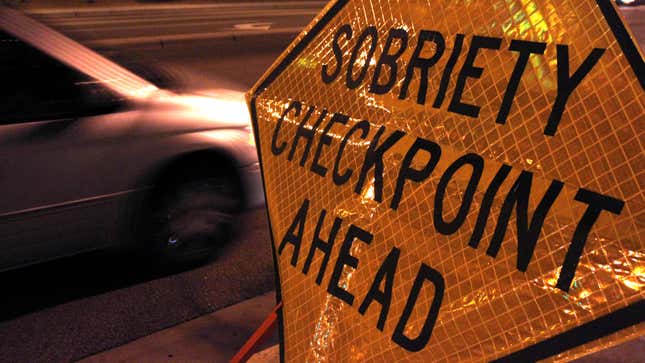
The Supreme Court ruled on some important stuff today with significant implications for the fate of our country for decades to come. This ruling, though, may be the weirdest of the bunch:
The Supreme Court has ruled that police may, without a warrant, order blood drawn from an unconscious person suspected of driving under the influence of alcohol.
That may not sound super weird, but the deeper one dives into the case and its ruling, the odder it gets.
The ruling came in Mitchell v. Wisconsin, in which the plaintiff was found by police walking near his car, failed a breathalyzer, but passed out before he could be given a more reliable breath test at the police station. So the cops took him to the hospital where they had his blood drawn and tested for alcohol. Obviously, Mitchell could not consent because he was passed out, nor was a warrant acquired.
But Wisconsin, along with 28 other states, has a law allowing police to take blood from a drunk driving suspect if they are unconscious, according to NPR. The logic this law operates under is, to use a legal term, really freaking whack. Drivers, apparently, give implied consent to submit to blood tests simply by using public roads.
Wisconsin justifies its blood-taking law by flipping the idea of consent on its head: everyone who uses public roads has given consent to have their blood drawn, the logic goes, but anyone also has the right to withdraw that consent. But, you also have to indicate somehow that you withdraw said consent. Sucks for you if you happen to be unconscious and therefore unable to withdraw that consent.
Here’s the really screwed up part: the Supreme Court basically punted on that whole concept and instead ruled in favor of Wisconsin on totally different grounds. From NPR:
The opinions reflect a deep divide over an essential question: whether the Wisconsin case should be decided on the basis of implied consent or on the question of what kind of emergencies allow for an exception to Fourth Amendment protections.
The five justices for the majority opinion, almost entirely made up of the court’s Republican wing —Roberts, Alito, Thomas, Breyer, and Kavanaugh—were convinced by a completely different argument, that “exigent circumstances” permitted police to take the suspect’s blood without consent or a warrant.
The Justices found that, in short, police are very busy and making them get a warrant is too time-consuming and burdensome in cases of such dire public threat as a, um, sleeping person.
The majority opinion also found that unconscious drivers pose an inordinate threat to public safety, which is an exigent circumstance of its own. But I struggle to think of a scenario where an unconscious driver is in a position to have his blood taken by police and still poses a threat to public safety. It’s not like the cops have to let the person go, especially after failing a preliminary breathalyzer.
In any event, Justice Sotomayor pointed out in her dissent that Wisconsin’s lawyers weren’t even arguing on the grounds of exigent circumstances, and had even conceded there were none:
Wisconsin has not once, in any of its briefing before this Court or the state courts, argued that exigent circumstances were present here. In fact, in the state proceedings, Wisconsin “conceded” that the exigency exception does not justify the warrantless blood draw in this case.
In other words, the five justices ruled in favor of a bad argument Wisconsin’s lawyers weren’t even making, and had even conceded was a bit nonsensical.
Obviously, drunk driving is inexcusable and anyone found guilty of doing so should be punished according to the law, and the law should reflect the severity of putting yourself and others at significant risk for no justifiable reason.
But to derive from that basic observation a statute that means every driver gives implied consent to a blood test simply by using a public road strikes me as not only a bizarre contortion of basic logic, but a dangerous precedent about the very definition of consent.